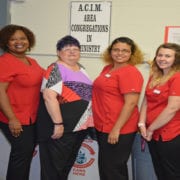VGCC Pharmacy Technology students serve community
Students in the Pharmacy Technology program at Vance-Granville Community College have been participating in a unique “community pharmacy practice” clinical rotation at a Granville County nonprofit organization.
Under the supervision of Pharmacy Technology Program Head Dr. Erica Fleming, students completed part of their clinical rotation at Area Congregations in Ministry (ACIM) in Oxford on Fridays during the spring semester. The students provided health services for ACIM clients such as blood pressure checks, diabetes risk assessments and medication therapy services, while also providing information on vital health issues, stroke awareness and chronic disease state management.
The mission of ACIM, an organization made up of Granville County churches and faith-based organizations, is to provide food and other resources and services to Granville County citizens in need. In addition to food items, ACIM is able to provide financial assistance for housing and utilities to clients who meet certain eligibility requirements.
This marked the fourth semester that VGCC students have worked with clients at ACIM. Sue Hinman, ACIM’s executive director, said the partnership with the college is the first of its kind for her organization. “This partnership is awesome,” Hinman said. “My clients are getting to know the students, and it makes a huge difference that our clients know that there is someone they can talk to and get information about medications, so that they can take better care of themselves.” She added that by collaborating with the Pharmacy Technology students and faculty, she and her volunteers have also gained a better understanding of the medications that their clients are taking.
Fleming said that the partnership is helping not only the community, but also the students. “Rotating here is an example of community pharmacy practice,” she said. “We want to expose our students to this area in the field of pharmacy and expand their perspective. This experience gives students another way to apply what they learn in class. It’s a good way to learn about various diseases, because we never know what we are going to encounter.” Fleming said students sometimes need to research problems that clients have and come back the next week to offer them possible solutions. “We screen people for diabetes and high blood pressure and counsel them on their medications,” she said. “We also provide them with information about services that can help them pay for prescriptions, like NC MedAssist.”
Fleming added that through her program’s “Rx 4 Life” project, her students give each ACIM client a handy medication card that they can keep in their pocket. On the card, clients can make a list of all their medications, the reasons they use them and when to take them. The card also has spaces for important phone numbers and other information.
“The purpose of the project is to empower patients to take an active role in managing their medications, to increase patient medication knowledge, to optimize medication use to improve therapeutic outcomes for patients and to provide patients with a portable medication record,” Fleming said. Another card that students created and distributed to clients has information on the signs of stroke, as well as the client’s target weight, cholesterol levels, blood pressure and blood glucose. Awareness of the targets for these major risk factors of stroke gives patients specific areas to focus on when setting health care goals. Spaces on the card allow them to track their actual data over time.
Fleming said that overall, the ACIM partnership has helped her program “to develop community ties and promote awareness of us as a resource.” She estimated that her students have seen almost 400 clients to date.
Tamika Everett of Creedmoor, one of the spring semester students, recalled one remarkable incident. “We had a client who lived by herself,” Everett said. “She came in to receive services from ACIM, not intending to visit us, but she saw us and came over.” The students checked her blood pressure and were shocked to find that her systolic blood pressure number was over 220, which generally indicates a life-threatening hypertensive crisis.
Fleming notified the client’s primary care provider and immediate family members, and then took her to a nearby emergency room for monitoring and treatment. “We’re glad we were able to help her, because who knows what would have happened?” Everett wondered. Fleming said that is just one dramatic example of how area residents visit ACIM because of one particular need but end up receiving help with other needs, including health and medication management issues.
For information on volunteering at ACIM, call (919) 690-0961. For more information on the VGCC Pharmacy Technology program, call Dr. Fleming at (252) 738-3482.
–VGCC–

